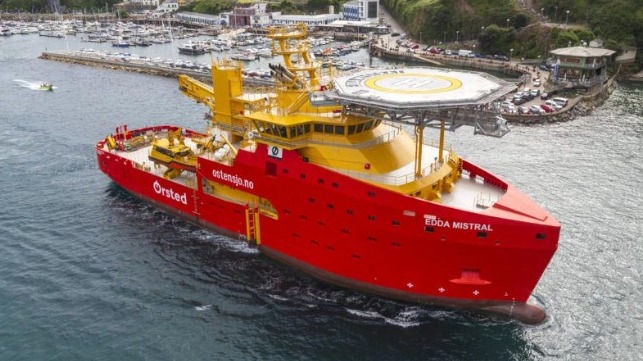Liquid Organic Hydrogen Could Facilitate Hydrogen as Propulsion Fuel

A new Norwegian-German partnership is proposing a solution for zero-emission shipping based on liquid organic hydrogen carrier which they believe can revolutionize the use of hydrogen as a marine fuel. According to the partnership, the new process addresses the concerns of safety as it is neither inflammable nor explosive while providing a means of storing and transporting hydrogen for use in propulsion.
Hydrogenious LOHC Maritime AS is a joint venture between Johannes Østensjø dy AS, which operates offshore vessels, and Hydrogenious LOHC Technologies GmbH, a German company that has developed and patented a technology for loading hydrogen in a thermal oil as well as releasing it where and when it’s needed. They will work to commercialize the organic oil loaded with hydrogen as a liquid organic hydrogen carrier (LOHC). The company is aiming to have a megawatt-scale commercial product ready by 2025 and the Norwegian Ministry of Climate and Environment will be providing nearly $3 million through its Enova project to fund the development of the hydrogen oil.
“Of all the potential zero-emission technologies, we find LOHC the most promising one. That is why we have prepared all six service operation vessels under construction in our subsidiary, Edda Wind, for LOHC-based propulsion,” said Håvard Framnes, Investment Director in Østensjø. “Safety is of course very important for us in these evaluations. However, the fact that we can use existing fuel infrastructure and are able to use familiar fueling procedures is of importance. In addition, we can easily carry enough energy onboard our vessels in order to operate in normal intervals of up to four weeks without refueling.”
By binding the hydrogen to the LOHC, the partners said they are creating a safe and low-cost technology. An important challenge for using hydrogen in shipping is safety. They believe that LOHC solves this and provides a safe, easy, and efficient way of storing and transporting hydrogen.
They believe that this technology will revolutionize the supply chain for hydrogen, as LOHC can be used to store and transport large quantities of hydrogen under ambient conditions, using the already existing fossil fuel infrastructure. The carrier oil – Benzyltoluene – can be loaded and unloaded with hydrogen many hundreds of times and is recyclable. The energy density of LOHC is also favorable, as a vessel can store two to three times more energy compared to compressed hydrogen.
“Our technology is very suitable for maritime use,” says Dr. Daniel Teichmann, CEO and founder of Hydrogenious LOHC Technologies. He believes it will be optimal to first apply the technology to the shipping industry. “Hydrogenious LOHC Maritime AS will make our proprietary LOHC technology available for onboard solutions for sustainable maritime traffic.”

that matters most
Get the latest maritime news delivered to your inbox daily.
The planned application will integrate three core components on-board: The LOHC Release Unit, which releases hydrogen from the liquid organic carrier Benzyltoluene on demand on the ship, as well as a fuel cell and an interface to the ship’s power management system.
Enova SF has agreed to fund the development of a 200 kW pilot of the LOHC/fuel cell propulsion system with a grant of approximately $3 million.
